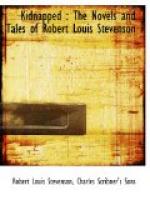“The great affair,” I asked, “is to bring home to him the kidnapping?”
“Surely,” said Mr. Rankeillor, “and if possible, out of court. For mark you here, Mr. David: we could no doubt find some men of the Covenant who would swear to your reclusion; but once they were in the box, we could no longer check their testimony, and some word of your friend Mr. Thomson must certainly crop out. Which (from what you have let fall) I cannot think to be desirable.”
“Well, sir,” said I, “here is my way of it.” And I opened my plot to him.
“But this would seem to involve my meeting the man Thomson?” says he, when I had done.
“I think so, indeed, sir,” said I.
“Dear doctor!” cries he, rubbing his brow. “Dear doctor! No, Mr. David, I am afraid your scheme is inadmissible. I say nothing against your friend, Mr. Thomson: I know nothing against him; and if I did—mark this, Mr. David!—it would be my duty to lay hands on him. Now I put it to you: is it wise to meet? He may have matters to his charge. He may not have told you all. His name may not be even Thomson!” cries the lawyer, twinkling; “for some of these fellows will pick up names by the roadside as another would gather haws.”
“You must be the judge, sir,” said I.
But it was clear my plan had taken hold upon his fancy, for he kept musing to himself till we were called to dinner and the company of Mrs. Rankeillor; and that lady had scarce left us again to ourselves and a bottle of wine, ere he was back harping on my proposal. When and where was I to meet my friend Mr. Thomson; was I sure of Mr. T.’s discretion; supposing we could catch the old fox tripping, would I consent to such and such a term of an agreement—these and the like questions he kept asking at long intervals, while he thoughtfully rolled his wine upon his tongue. When I had answered all of them, seemingly to his contentment, he fell into a still deeper muse, even the claret being now forgotten. Then he got a sheet of paper and a pencil, and set to work writing and weighing every word; and at last touched a bell and had his clerk into the chamber.
“Torrance,” said he, “I must have this written out fair against to-night; and when it is done, you will be so kind as put on your hat and be ready to come along with this gentleman and me, for you will probably be wanted as a witness.”
“What, sir,” cried I, as soon as the clerk was gone, “are you to venture it?”
“Why, so it would appear,” says he, filling his glass. “But let us speak no more of business. The very sight of Torrance brings in my head a little droll matter of some years ago, when I had made a tryst with the poor oaf at the cross of Edinburgh. Each had gone his proper errand; and when it came four o’clock, Torrance had been taking a glass and did not know his master, and I, who had forgot my spectacles, was so blind without them, that I give you my word I did not know my own clerk.” And thereupon he laughed heartily.




